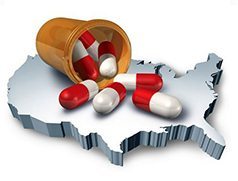New Hampshire Ranks 2nd to Last Across the Country for Capacity to Provide State Funded Treatment to Those in Need
State Currently Can Only Serve 4-6% of Population Seeking Treatment
PORTSMOUTH, N.H. – This week in State of Affairs, we focus our attention on the Granite State, known for its beautiful small towns and Mount Washington, the highest peak in that region of the U.S. The first primary state, it is certainly no stranger to political headlines as Presidential hopefuls often make the journey to gain support. But something much more cunning and sinister than any politician ever dared to be is approaching the people of New Hampshire in its trek to devour the United States bite by bite – addiction.
“New Hampshire is experiencing devastating effects from heroin and opioid misuse,” says Sandi Coyle, Regional Coordinator for the Seacoast Public Health Network. “However we rank among the top in the nation for underage alcohol, marijuana and prescription drug use.”
The Seacoast Public Health Network mobilizes community resources to support environmental strategies to prevent substance use disorders, leverage funding and resources to prevent, treat and support recovery of SUD’s and increase awareness. Coyle also works with Safe Harbor Recovery Center (not yet a center, the group is setting course towards a capital campaign), which is a grassroots effort to create a facility that offers recovery support services such as recovery coaching, all recovery meetings, vocational training and job matching, life skills training and a face and voice of recovery to reduce stigma and help any individual seeking help from the impact of addiction, much like Vertava Health.
“Parts of these problems are more visible, but it’s all a threat,” says Coyle. “Alcohol continues to be the drug of choice.”
The state isn’t taking it lying down. Many efforts have been put forth to combat what’s known as “America’s quiet epidemic”. New Futures is promoting advocacy, lobbying around key legislative issues and recovery community engagement. Resources are directed to prevention, treatment and recovery in many ways.
“Communities are mobilizing to create recovery centers,” says Coyle. “Lawmakers are trying to support policies and the Governor is trying to pass a budget for increased resources.”
Service providers are working hard to address the issues with clients. The state recently passed a law providing the use of Narcan, a known antidote for heroin overdose, to put it in the hands of police and family members. New Hampshire is also working on a Good Samaritan law to help people report an overdose without legal ramifications.
Massachusetts’ Gloucester Police Department recently made headlines by taking people directly into treatment vs. jail (they are expected to make an announcement regarding these efforts sometime next week). Portsmouth has enacted similar programs like Community Access to Recovery Day. This is a day in the year during hospitals, police and recovery groups come together to offer treatment resources and information to the public under an umbrella of amnesty and anonymity.
“Laconia has a dedicated PET (Prevention Education and Treatment) Officer,” says Coyle.
Still, Coyle says the number of deadly overdoses in the state have significantly increased. The state saw 321 overdose deaths just last year, 288 of which reported opiates to be the primary cause. That’s up from just 171 total overdose deaths in 2010. Last year, 50% of treatment admissions in New Hampshire were due to opioid use.
New Hampshire’s Drug Czar, John Wozmak has been fighting the epidemic from a political and economical angle, saying New Hampshire is losing money by not having enough resources in place. His data states that just last year 1680 job applicants in the state failed a drug test.
What’s worse is the effect the disease has had on pregnant women in the state. 120 newborns last year experienced withdrawal and required special treatment before leaving the hospital last year.
One thing is clear: New Hampshire needs our help, and Vertava Health is ready. If you or someone you know is battling the disease of addiction, call our 24-hour hotline at 844-470-0410.
Pain is inevitable, but suffering is optional.
Sandi Coyle is one of the thirteen Regional Substance Misuse Prevention Coordinators for the Seacoast Public Health Network operating through state and federal funding on behalf of the NH Bureau of Drug and Alcohol Services and privately funds from the New Hampshire Charitable Foundation. She is the current elected Board President for the NH Alcohol and Other Drug Service Providers Association, a member of the Governor’s Commission Recovery Task Force, and has a seat on the board for HOPE for NH Recovery. More recently, she has become a public figure and advocate for addiction recovery bringing to light her 11 years of lived experience in active recovery from alcohol and other drugs. She is currently supporting grassroots efforts in the Seacoast to develop one of NH’s first Community Recovery Centers.


